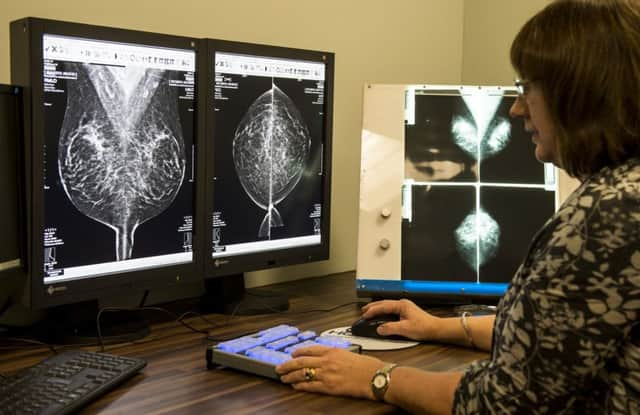Scientists hail breakthrough in understanding how cancers develop


In the largest study of its kind, an international team of experts scrutinised billions of letters of DNA from 560 breast cancer patients to uncover how errors in the DNA code can cause cells to become cancerous.
The research could lead to better treatments for patients as well as bringing scientists closer to finding out how breast cancer is caused.
Advertisement
Hide AdAdvertisement
Hide AdHuman DNA is regularly damaged by things in the environment such as viruses or from normal wear and tear within the cells.
This mutation to the cell can form patterns – that scientists can detect and use to extract clues about the causes of cancer.
Researchers have now identified 93 genes out of 20,000 in the human genome that could create tumours if they mutated, which is the most definitive list to date, according to the two papers published in Nature and Nature Communications journals yesterday.
The findings included five new genes associated with cancer and 13 new mutations that influence the development of a tumour.
Professor Sir Mike Stratton, one of the lead authors from the Sanger Institute in Cambridge, told The Scotsman that it was a “significant moment” for breast cancer research.
He said: “This is getting towards being a comprehensive list of genetic mutations.
“That is the list that we will give to the drugs companies and the universities so they can develop their treatments using this framework.
“Cancer is a devious beast, so there will always be changes as it evolves but there is a real sense that we are nearing completion here.
Advertisement
Hide AdAdvertisement
Hide Ad“This is a significant moment for us to pause and think about where we are going.
“I think there is cause for optimism though it must be tempered as we are not there yet.”
It is hoped the study could lead to more targeted medicines that are increasingly being called for to treat the disease.
The drug Herceptin was approved for use on the NHS in recent years for women with a particularly aggressive form of cancer known as HER2-positive. The team believe this discovery could be used to classify patients more accurately for treatment.
It found women with the BRCA1 gene variant, carried by the Hollywood star Angelina Jolie, had whole cancer genome profiles that were highly distinctive from each other and were also very different to other breast cancers.
The harmful mutation and its cousin BRCA2 can significantly increase the risk of breast and ovarian cancer, causing some women to opt for a mastectomy to reduce their chances of getting the disease.
Dr Serena Nik-Zainal, another author from the Sanger Institute, said: “In the future, we’d like to be able to profile individual cancer genomes so that we can identify the treatment most likely to be successful for a woman or man diagnosed with breast cancer.
“It is a step closer to personalised healthcare for cancer.”
Advertisement
Hide AdAdvertisement
Hide AdThe research could also bring scientists closer to finding out what causes breast cancer, which kills more than 1,000 Scots each year.
Using knowledge of these mutations, the team now hopes to work backwards to uncover what causes the changes and eventually to reduce the risk of cancer developing.
Where these mutations occur in breast cancer genes is also important, said collaborator Dr Ewan Birney.
Dr Birney, from the European Bioinformatics Institute, said: “For years we have been trying to figure out if parts of DNA that don’t code for anything specific have a role in driving cancer development.
“This study both gave us the first large-scale view of the rest of the genome, uncovering some new reasons why breast cancer arises, and gave us an unexpected way to characterise the types of mutations in certain breast cancers.”
Cancer campaigners welcomed the findings as an important step but some experts urged caution.
Edinburgh-based breast cancer expert Professor Mike Dixon said: “Genetics may give us targets for treatments but it is a very complex field.
“I think the findings are very interesting but we should be cautious.”
Advertisement
Hide AdAdvertisement
Hide AdDr Emma Smith, from Cancer Research UK, said: “This study brings us closer to getting a complete picture of the genetic changes at the heart of breast cancer.
“Understanding these underlying processes has already led to more effective treatments, so genetic studies on this scale could be an important stepping stone towards developing new drugs and boosting the number of people who survive cancer.”